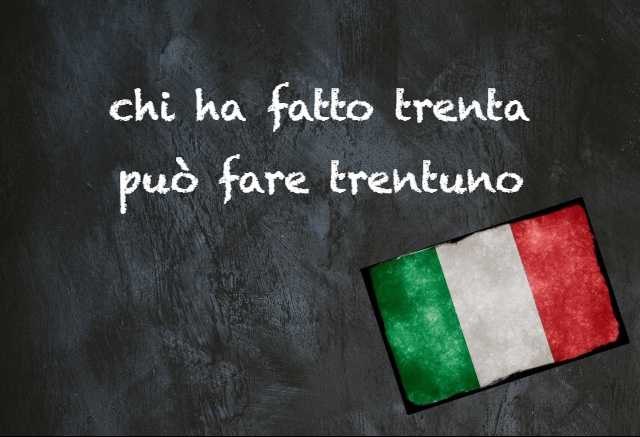Italian expression of the day: ‘Chi ha fatto trenta può fare trentuno’

You really should push yourself to learn this Italian phrase.
Most languages have at least one phrase contains the idea of pushing yourself to go one step beyond what’s required or expected, or ‘going the extra mile’.
In Italian, this idea is embodied in the saying ‘Chi ha fatto trenta può fare trentuno’ – literally, if you’ve done 30, you can do 31.
It’s widely attributed to Pope Leone X, who in 1517 was announcing his picks for a council of 30 cardinals and realised he’d left one of his most esteemed prelates off the list.
To the surprise of everyone assembled in the room, the tale goes, he added the man’s name at the bottom, shrugging off the crowd’s consternation by reasoning ‘Chi ha fatto trenta può fare trentuno’.
These days you might use the phrase to encourage someone to push themselves to do a little bit of extra work having already completed a task, or to upsell someone on a product.
Slight variations are avere fatto trenta e fare trentuno and fatto trenta, facciamo trentuno.
Avete fatto trenta: perche non fare trentuno e includere l’assicurazioni facultative?
You’ve already gone this far – why not go the whole hog and include the optional insurance?
Fatto trenta, facciamo trentuno.
In for a penny, in for a pound.
Now you've learned this phrase, why not fare trentuno and use it in conversation this week?
Do you have an Italian word you’d like us to feature? If so, please email us with your suggestion.
Comments
See Also
Most languages have at least one phrase contains the idea of pushing yourself to go one step beyond what’s required or expected, or ‘going the extra mile’.
In Italian, this idea is embodied in the saying ‘Chi ha fatto trenta può fare trentuno’ – literally, if you’ve done 30, you can do 31.
It’s widely attributed to Pope Leone X, who in 1517 was announcing his picks for a council of 30 cardinals and realised he’d left one of his most esteemed prelates off the list.
To the surprise of everyone assembled in the room, the tale goes, he added the man’s name at the bottom, shrugging off the crowd’s consternation by reasoning ‘Chi ha fatto trenta può fare trentuno’.
These days you might use the phrase to encourage someone to push themselves to do a little bit of extra work having already completed a task, or to upsell someone on a product.
Slight variations are avere fatto trenta e fare trentuno and fatto trenta, facciamo trentuno.
Avete fatto trenta: perche non fare trentuno e includere l’assicurazioni facultative?
You’ve already gone this far – why not go the whole hog and include the optional insurance?
Fatto trenta, facciamo trentuno.
In for a penny, in for a pound.
Now you've learned this phrase, why not fare trentuno and use it in conversation this week?
Do you have an Italian word you’d like us to feature? If so, please email us with your suggestion.

Join the conversation in our comments section below. Share your own views and experience and if you have a question or suggestion for our journalists then email us at [email protected].
Please keep comments civil, constructive and on topic – and make sure to read our terms of use before getting involved.
Please log in here to leave a comment.